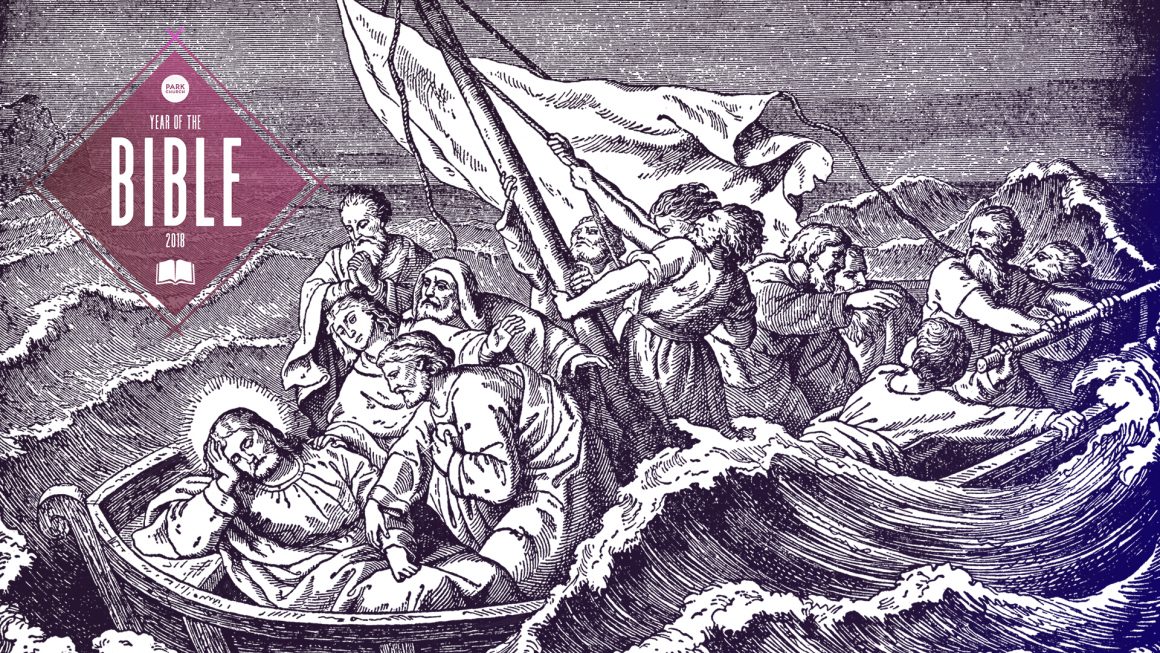Have you ever thought you had someone figured out only to be totally surprised by their true identity? Whether you have or not that pretty much sums up the sentiment in the final episode in Mark 4 (vv.35-4). The disciples are totally blown away (pun intended) as they begin to realize who they woke in their distress over the stormy sea. Although this episode is recorded in Matthew, Mark and Luke there are certain details which are unique to Mark’s rendition that are worth taking note of. As I said in an earlier posting, the Bible is really good literature and I hope to enhance your appreciation of that by highlighting a few features in this very dramatic story through the eyes of Peter.
Who then is this?
There are a couple of elements in Mark that set his story apart from that of Matthew and Luke. For one, it is a bit more detailed than the other two and secondly, Mark’s choice of words brings the listener right into the emotional heart of what the disciples were experiencing. Concerning the specific wording, there are three times when Mark uses the word megas. It’s a Greek word that means “great” or “large”, hence megaton or megabyte in our time. Mark uses it to describe “a great wind” (v.37), “a great calm” (v.39) and “a great fear” (v.41). It is the triple use of this adjective that makes Mark’s story unique. Although Matthew uses the same adjective to describe “a great shaking” (Matt.8:24) and the occurrence of “a great calm” (v.26) he does not use it in his conclusion. Luke does not use the word megas at all but rather chooses other dramatic Greek terms to depict the drama. My point is that the triple use of megas in Mark seems very intentional. For those who were hearing the story in Greek the phonetic repetition in the triple use of megas would serve to intensify the final statement; “they feared a great fear” which frames their gasping question, “Who then is this, that even the wind and the sea obey him?” (Mark 4:41). While the obvious answer to this question might call for some profound reflection (of course only God can command the forces of nature) there remains to be a second detail in Mark that indicates the moment of their realization of Jesus’ identity was quite alarming.
There is a little clause unique to Mark that I think is worth noting. In the beginning of this episode we are told that the disciples accepted Jesus into their boat “just as he was” (v.36). This small detail might be considered insignificant but if we take a closer look at the way in which the disciples address the sleeping Jesus during their time of need, we get a better clue as to what the disciples finally experienced. In Matthew we read that the disciples cried out “save us Lord” (Matt. 8:25). And in Luke we read that they woke Jesus with, “Master, master, we are perishing!” (Luke 8:24). The Greek address used in Luke is equivalent to the respectful Hebrew term “Rabbi”. Matthew and Luke seem to be depicting a reverential or at least respectful manner. In Mark, however, we read that the disciples called out to the sleeping Jesus, “teacher, do you not care that we are perishing” (Mark 4:38). In any event, it does not look like the disciples in Mark expected any kind of miraculous deliverance. On the contrary, it looks like they were responding in frustration and despair. While the seasoned fishermen aboard the boat were struggling to keep it afloat their passenger, the learned teacher, seemed to be indifferent, asleep as they toiled against insurmountable odds. To put it another way, they might have been saying, “Hey doc! Don’t you care? Get up and bail!”
Sometimes that is exactly how we feel. Forget the theology. I need real help now.
The fear the disciples experienced in the great calm was compounded by the fact that they had no idea of who Jesus really was. Up until that point they viewed Jesus as a gifted teacher and healer but now they were confronted with something even more profound. As Mark’s gospel unfolds we see that the revelation of Jesus the Christ becomes even more profound as he makes his way to Jerusalem and the cross. Although we read these things in hindsight the gospel writers remind us of the marvelously surprising ways in which God works out his eternal plan. Fixed from the beginning he will bring it to pass. Jesus told his disciples we need to go to the other side and he secured their arrival.
Are you facing storms today? Look to Jesus.
He is unfazed by the storm; even more, he is able to quiet it by his divine command. Let’s continue reading through Mark and marvel with his disciples as they come to grips with “who then is this?”



